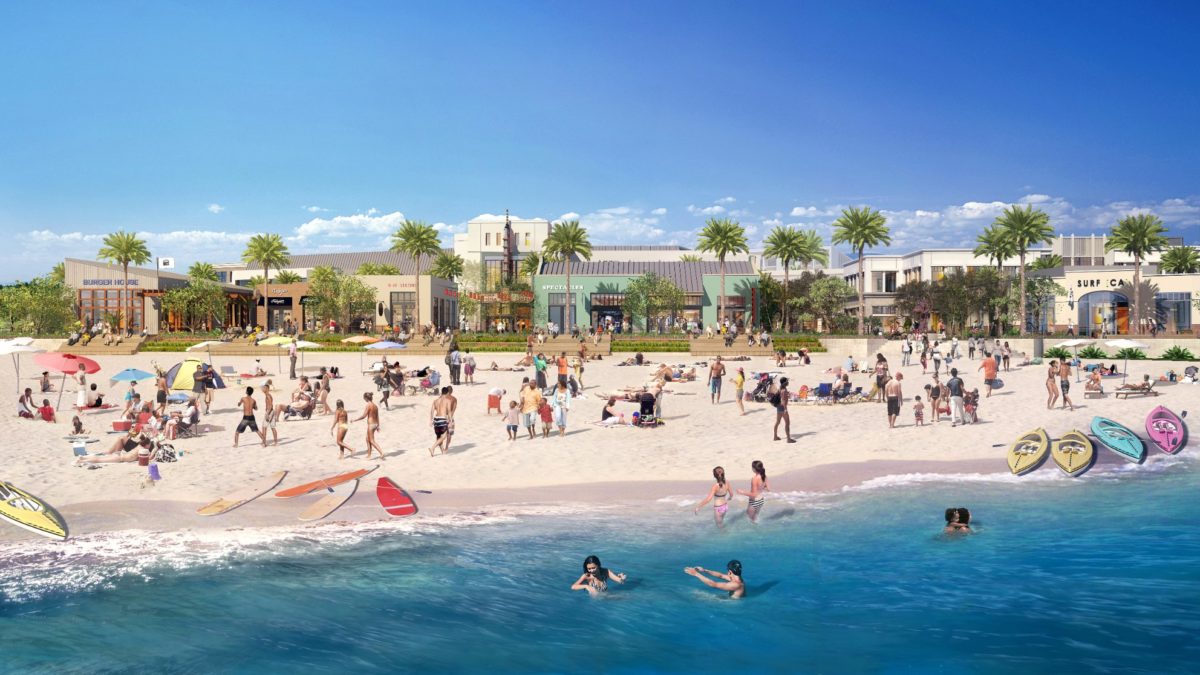Waterfront Development CenterCal lease agreement severed

CenterCal’s proposed render for a redeveloped Seaside Lagoon. Courtesy CenterCal
The City of Redondo Beach has terminated its lease agreement with Waterfront: Redondo Beach developer CenterCal Properties. The action follows a lawsuit filed by CenterCal in federal court claiming, among other things, that the City has violated CenterCal’s right to property and due process.
CenterCal’s claim follows the City’s passage of Measure C on March 7, a ballot measure that rezoned the Redondo Waterfront, stalling the construction of CenterCal’s planned $400 million redevelopment retail and hotel project.
The City’s notice of termination informing CenterCal of the severance was delivered to CenterCal offices on Oct. 26. It states that the company defaulted on two separate provisions of the Agreement for Lease of Property and Infrastructure Financing (ALPIF), a framework for leasing the Waterfront to CenterCal.
The defaulted clauses include a lawsuit, which was filed by CenterCal in the U.S. District Court rather than in Los Angeles County Superior Court, as required by the ALPIF. The City also claims that CenterCal owes more than $1 million in reimburse costs for environmental consultants, attorneys, and other services related to entitlements, permitting and approvals.
City Attorney Michael Webb declined to comment on the matter, except to say the City has filed a motion to dismiss CenterCal’s lawsuit.
“I don’t think the City has a snowball’s chance in hell in prevailing with the notion that [CenterCal violated] the forum selection clause,” said Betty Shumener, an attorney representing CenterCal, of filing in U.S. District Court. “I think that argument has no merit.”
The reason for filing in federal court, rather than LA County, she said, is due to CenterCal’s claim that the City is violating the developer’s constitutional rights to property and due process in preventing the development of the Waterfront project.
Shumener also dismissed the City’s claim to reimbursement.
“I don’t know how much more clearly to state it; the reimbursement agreement no longer exists,” Shumener said. “To say it was a breach of the ALPIF after the agreement is terminated is crazy, and they know it.”
In its lawsuit, CenterCal argues that they obtained vested rights in the property on June 23, 2016, when the City deemed their applications for development were completed.
In January, City Council approved the ALPIF. Under the agreement, CenterCal would have paid $127 million to improve public infrastructure, including parking structures. The land would be leased to CenterCal for 99 years, with 30 years of $250,000 minimum rent, increased to $1 million annually for the final 60 years. The vote was split, 3-2, with then-Councilman Bill Brand among the dissenters.
The following March, Measure C was passed with the support of Brand, newly elected as Mayor, and incoming Council members Nils Nehrenheim and Todd Loewenstein.
Writers of Measure C stated it was a “fine-tuning” of existing zoning, made necessary by what they considered a lack of consideration for residents in the Waterfront project’s design. It established height restrictions, locations for parking garages, and guarded against changes to Seaside Lagoon. Residents approved of the new zoning, voting 9,229 in favor to 6,925 against.
CenterCal’s lawsuit argues that Measure C has “no substantial relation to public health, safety, morals or general welfare,” and that Brand, Nehrenheim, and Loewenstein are promoting a “localism agenda” in blocking CenterCal from proceeding.
Brand declined to comment specifically on the litigation, though he restated his opposition to the project.
“I never supported the CenterCal project or the 99-year lease our previous Mayor and City Council narrowly approved, which was a major factor in the March elections,” Brand said.
The federal lawsuit brought against the City by CenterCal is just one of several suits the City is involved in. The City is also being sued by CenterCal in state court over Measure C, and over a dispute with CenterCal regarding a public records request of emails from Brand and former Councilman Steve Sammarco. The City is facing a California Environmental Quality Act lawsuit filed by development activist and Harbor Commissioner Jim Light disputing the city’s Environmental Impact Report.
The CEQA lawsuit is scheduled to go to trial later this month, Webb said, and a hearing regarding Measure C will take place in December. A hearing regarding the ALPIF was scheduled for Monday but was taken off of the calendar.
“In terms of consequences, it’d be a poor idea for me to comment when we have so many open pieces of litigation,” Webb said.

